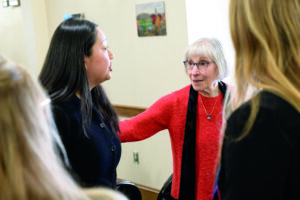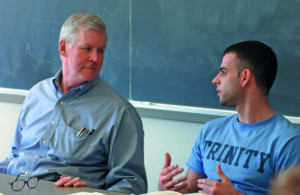Public Policy & Law
Celebrating 20 years and a vision brought to life
“It was a window in time at Trinity when there was a lot of innovation going on,” Renny Fulco says of the early 2000s, when the College’s Public Policy and Law Program—now marking its 20th anniversary—began to take shape.
Fulco, who joined the Trinity faculty in 1983 and retired this spring as associate professor of legal and policy studies, emerita, was part of the team tapped by then-President Evan S. Dobelle H’01 and the late W. Miller Brown, professor of philosophy, emeritus, and former dean of the faculty, to review and reenvision the small public policy major, which focused on economics.
She worked alongside Andrew J. Gold, professor of economics and public policy, emeritus, who was then director of the public policy program, and the late Edward “Ned” Cabot, former adjunct professor of public policy and law, to design the new program, which gained official approval in 2004.
“We realized a lot of students who were interested in policy were also interested in law. And Ned said, ‘You can’t study public policy if you don’t know about the law,’ so we added that component,” says Fulco, who served as director of the program from its inception until 2023. “I think there were eight or nine students in the major at the beginning, and we now have about 125. Clearly, we did something right.”

A gathering on campus in April 2024 celebrated both Fulco’s career and the program’s milestone anniversary. Alumni Ethan Cantor ’16 and Brendan W. Clark ’21 organized the occasion, which included tributes from current and former faculty members, as well as panel discussions with current students and with alumni working in the fields of public policy or law. The event was a surprise to Fulco, who was touched by the outpouring of memories and thanks she received and by the continued donations to the Fulco-Cabot Fund [see below].
Stefanie Chambers, John R. Reitemeyer Term Professor of Political Science and interim director of the Public Policy and Law Program, notes, “While the major has grown in terms of numbers of students, the curriculum that Ned and Renny devised remains largely unchanged because it was so unique and forward-looking.”
Grounded in the liberal arts, the program provides students with the tools of analysis in social science, law, and the humanities needed to understand the substance of public policy concerns. Chambers says that key distinctions of the curriculum are its dual focus on policy and law, its multidisciplinary approach, and its focus on applied and experiential learning through the incorporation of practitioner faculty and required student internships.
As one way to focus on the law, Cabot developed the course “Law, Argument, and Public Policy,” which today is taught by Glenn W. Falk, professor of the practice in public policy and law. “Students not only study legal reasoning and cases but also engage in exciting collaborative work,” Fulco says.
David Kimball-Stanley ’09, an associate at the law firm of Clarick Gueron Reisbaum in New York City, says he probably wouldn’t have seriously considered going to law school without the Public Policy and Law Program. “When I was a first-year student, Professor Cabot’s seminar was a crash course in famous Supreme Court cases. The second half of the semester, students would hold oral arguments for certain historic cases, with students assigned a side and others acting as judges,” he says. “It was some of the most fun I’ve ever had in a classroom.”
Students in the major may choose a concentration in educational policy, environmental policy, health policy, human rights and international policy, law and society, policy analysis, or urban policy. Fulco says that three foundational courses are required, and then students draw from related classes within Public Policy and Law or across a broad range of departments to complete major requirements. “I think students value the exposure to similar concepts but from different perspectives,” she says.
Each student pursuing the major is required to complete an internship. “Our goal,” Fulco says, “is that you bring what you learn in the classroom to your internship, and then you return with a new set of skills that you acquired from that internship.” Trinity’s location in the capital city of Hartford offers students access to state, regional, and local governments, as well as to lobbyists and numerous nonprofit and advocacy organizations involved in the making of law and policy.
Brooke LePage ’19, a policy analyst on the Democratic staff of the Congressional Joint Economic Committee in Washington, D.C., said that the curriculum shaped her policy interests and prepared her for graduate studies. “The courses that grabbed my attention in the program were those focused on education policy and gender equity—issues that have been a thread through my career,” she said.

Event co-organizer Cantor, a trial attorney for the U.S. Department of Justice in Washington, D.C., says, “The program introduced me to several faculty members in multiple departments who challenged me to think about policy issues through the lenses of their respective disciplines.” He adds, “The program also featured a wonderful group of adjunct faculty members, including several judges and attorneys, who were tremendous resources for students interested in becoming lawyers.”
Youlan Xiu ’15, a litigation associate at Latham & Watkins LLP in New York City, is a first-generation American who didn’t know a single lawyer or what practicing law might look like until she came to Trinity. “The skills I developed in this program made me that much more competitive in law school and still serve as the foundation for the work I do every day as a commercial litigator,” she says.
The lessons and experiences that form the core of this program remain as relevant today as ever, according to Fulco. “We teach critical thinking skills, including getting students to evaluate the sources they’re studying,” she says. “We encourage students to look at issues from all sides. Ned used to say, ‘You can’t give your best argument until you understand your opponent’s best argument.’ ”
For all the credit others give to her, Fulco says the program has always been a group effort, supported by faculty partners including Adam J. Grossberg, professor of economics, emeritus; Garth A. Myers, Paul E. Raether Distinguished Professor of Urban International Studies and director of the Center for Urban and Global Studies; Katharine G. Power, associate professor of theater and dance, emerita; Mark R. Silk, professor of religion in public life, emeritus; and Maurice L. Wade, professor of philosophy, emeritus, among others.
As one recent addition to the program, the Leonard E. Greenberg Center for the Study of Religion in Public Life is housed jointly in the Public Policy and Law Program and the Religious Studies Department. Fulco says, “The collaboration is a way of offering even more hands-on experience and of bringing speakers to campus who will provide students with further opportunities to think about the integration of what they do in the classroom with the real world.”
Fulco believes the program will continue to grow under the leadership of Chambers and Abigail Fisher Williamson, associate professor of political science and public policy and law, who is currently on sabbatical but will resume leading the program in January 2025. “It’s in very capable hands,” Fulco says.
Chambers notes that the program has been and continues to be a community. “Our faculty are dedicated teacher-scholars, and our students are enthusiastic and connected to the program, allowing us to continue to build on Renny’s lasting legacy,” she says.
To Fulco, the 20-year milestone celebrates a realized vision. “We wanted to create an academic home for students at Trinity, and we worked hard to develop enduring relationships,” she says. “What I didn’t imagine is that we would have such an amazing alumni network. The alumni want to stay connected to Trinity, to the program, and to one another, and they want to give back. That was always central to our vision—that you go out in the world and do good. Now I see alumni mentoring our current students, and it brings tears to my eyes. It’s something I’m so proud of.”
By Andrew J. Concatelli
The Fulco-Cabot Fund
In 2013, the Alumni Advisory Board for Trinity’s Public Policy and Law Program established an endowed fund at the College in honor of Renny Fulco and in memory of Ned Cabot. The fund supports public policy and law majors in pursuing research, internships, and other learning opportunities, especially when financial need would otherwise present an obstacle. The fund also supports the Fulco-Cabot Public Policy and Law Book Prize, which was established in 2004 and is awarded at Trinity’s Honors Day each spring to the student who writes the best paper in the area of public policy and law, as judged by the program faculty. “Alumni created the fund to support students, which is part of why this program is so special,” Fulco says. “This is how they are giving back to the program.” The total endowment of the fund now stands at more than $250,000.
